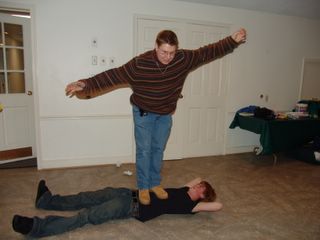A brief history of the word Catholic
My post on the pope brought up a very interesting question. That regarding the word Catholic with a capital "C" and catholic with a little "c". Thankfully people far smarter than myself know all about religious history. The questions raised were along the lines of aren't we all part of the Catholic church, just different types (Anglican, Roman and Orthodox)? Here's the answer I received from Greg Strong, a man whom everyone agrees is quite knowledgeable...Great! You have sparked the great schisms (break-ups) in the church again! But seriously, what can I say clearly and accurately in a short space on the use of the word "Catholic"? Let me attempt something. I hope it is helpful to you.
While the church from the very start began to show some local variations, differences and tensions, and even "break-offs" due to heresies in particular groups, there is a sense in which all those who accepted the Scriptures and the early church's creeds and councils were "catholic." Note the lowercase "c." The word "catholic" in this sense came from Greek words meaning "according to the whole." Sometimes people speak of it as synonymous with the word "universal," but in the early church I think they had somewhat different emphases. "Catholic" referred more to the sense of that which was accepted or believed according to the whole church. "Universal" referred more to the sense of the church being everywhere or being worldwide in scope.
It is in this lowercase "c" sense of catholic that Protestants (Anglicans, Presbyterians, Methodists, Lutherans, etc.) can confess in the Nicene Creed that we believe and participate in "one holy catholic and apostolic Church." We are catholic in this sense. We accept and believe in the faith of Jesus Christ as found in the Scriptures and the great creeds and councils of the early church. It is at least in this sense, too, that the Orthodox (i.e., Eastern Orthodox -- e.g., Russian, Greek, Ukrainian, Bulgarian, and so on) confess the catholic Church and participate in it.
Over the centuries, though, the churches in the West and the churches in the East began to drift apart (for a lot of complex reasons). Those in the West began to think of themselves as Catholics with their spiritual and organizational center in Rome. Those in the East began to think of themselves as Orthodox with their spiritual and organizational center in Constantinople -- that is, in Constantinople to some extent (the Eastern Orthodox regional and local churches are not as centrally organized as the Catholic Church in the West; they have a different approach to their relationships with each other).
Around 1000 A.D. the East and West split in what is called the "Great Schism." Then you really had a Roman Catholic Church in the West and Eastern Orthodox churches (regional and local) in the East. This is "Catholic" with a capital "C." By this point at least, it would have been unlikely for an Eastern Orthodox church person to think of himself or herself as Catholic, but he or she would still have confessed in the creed, for example, to being catholic. In the West everyone who was a member of a Christian church was a Catholic in the Roman Catholic sense, and was also one who confessed in the creed, for example, to being catholic (in the earlier sense). Though I think it is likely that Roman Catholics started at some point (either before the schism, during it, or after it; I don't know when) to blur the distinction between capital "C" Catholic and lowercase "c" catholic, with the effect that Roman "Catholic" and "catholic" tended to be one and the same, more or less precisely.
The situation changed further in the 1500s when the Reformation fractured the Roman Catholic Church. Then churches that were not Roman Catholic nor Eastern Orthodox could still confess "the one holy catholic and apostolic Church" and consider themselves catholic in that earlier sense of catholic with a lowercase "c," but not Catholic with a capital "C," because to them that meant the Roman Catholic Church. Hence, Protestants distinguished Roman Catholic and catholic.
So I think it would be tricky to speak of "Catholics of the Anglican Tradition" or "Catholics of the Roman tradition" or "Catholics of the Orthodox tradition." I think a lot of Anglicans, Roman Catholics, and Orthodox might find that inaccurate at best. But Anglicans would think of themselves as catholic but not Catholic; Roman Catholics would think of themselves as Catholic (and might not see any distinction between Catholic and catholic); and Orthodox would also think of themselves as catholic but not Catholic.
So, this is long and quite detailed. But it was a good explanation on why we use the word catholic in the Apostle's Creed and the word Catholic.
Peace.





0 comment(s):
> Post a comment
<< Home